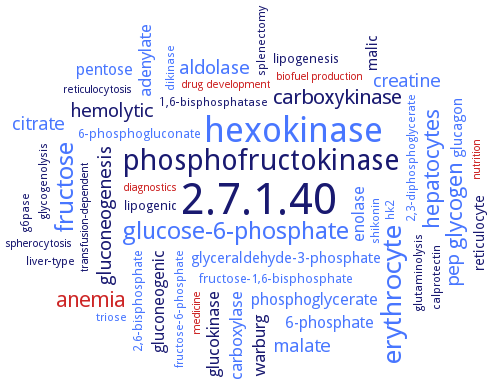2.7.1.40: pyruvate kinase
This is an abbreviated version!
For detailed information about pyruvate kinase, go to the full flat file.

Word Map on EC 2.7.1.40 
-
2.7.1.40
-
hexokinase
-
phosphofructokinase
-
erythrocyte
-
fructose
-
glucose-6-phosphate
-
hepatocytes
-
glycogen
-
anemia
-
carboxykinase
-
gluconeogenesis
-
aldolase
-
pep
-
hemolytic
-
malate
-
citrate
-
creatine
-
glucokinase
-
adenylate
-
carboxylase
-
warburg
-
gluconeogenic
-
enolase
-
phosphoglycerate
-
pentose
-
6-phosphate
-
malic
-
glucagon
-
glyceraldehyde-3-phosphate
-
reticulocyte
-
lipogenesis
-
6-phosphogluconate
-
fructose-1,6-bisphosphate
-
lipogenic
-
2,6-bisphosphate
-
g6pase
-
1,6-bisphosphatase
-
liver-type
-
splenectomy
-
hk2
-
dikinase
-
glutaminolysis
-
calprotectin
-
triose
-
shikonin
-
2,3-diphosphoglycerate
-
fructose-6-phosphate
-
glycogenolysis
-
drug development
-
medicine
-
biofuel production
-
reticulocytosis
-
transfusion-dependent
-
spherocytosis
-
nutrition
-
diagnostics
- 2.7.1.40
- hexokinase
-
phosphofructokinase
- erythrocyte
- fructose
- glucose-6-phosphate
- hepatocytes
- glycogen
- anemia
-
carboxykinase
-
gluconeogenesis
- aldolase
- pep
-
hemolytic
- malate
- citrate
- creatine
- glucokinase
- adenylate
- carboxylase
-
warburg
-
gluconeogenic
- enolase
- phosphoglycerate
- pentose
- 6-phosphate
-
malic
- glucagon
- glyceraldehyde-3-phosphate
- reticulocyte
-
lipogenesis
- 6-phosphogluconate
- fructose-1,6-bisphosphate
-
lipogenic
- 2,6-bisphosphate
- g6pase
-
1,6-bisphosphatase
-
liver-type
-
splenectomy
- hk2
- dikinase
-
glutaminolysis
-
calprotectin
- triose
- shikonin
- 2,3-diphosphoglycerate
- fructose-6-phosphate
-
glycogenolysis
- drug development
- medicine
- biofuel production
-
reticulocytosis
-
transfusion-dependent
-
spherocytosis
- nutrition
- diagnostics
Reaction
Synonyms
ATP/pyruvate O'-phosphotransferase, ATP:pyruvate 2-O-phosphotransferase, CPK, CPK1, cPK2, cPK3, cPK4, cPK5, CTHBP, cytosolic pyruvate kinase, cytosolic thyroid hormone binding protein, EHI_098420, EhPK, EhPyk, erythroid (R-type) pyruvate kinase, fluorokinase, hL-PYK, hLPYK, hPKM2, K+-dependent PK, K+-independent PK, kinase, fluoro- (phosphorylating), kinase, pyruvate (phosphorylating), L-PK


 results (
results ( results (
results ( top
top





